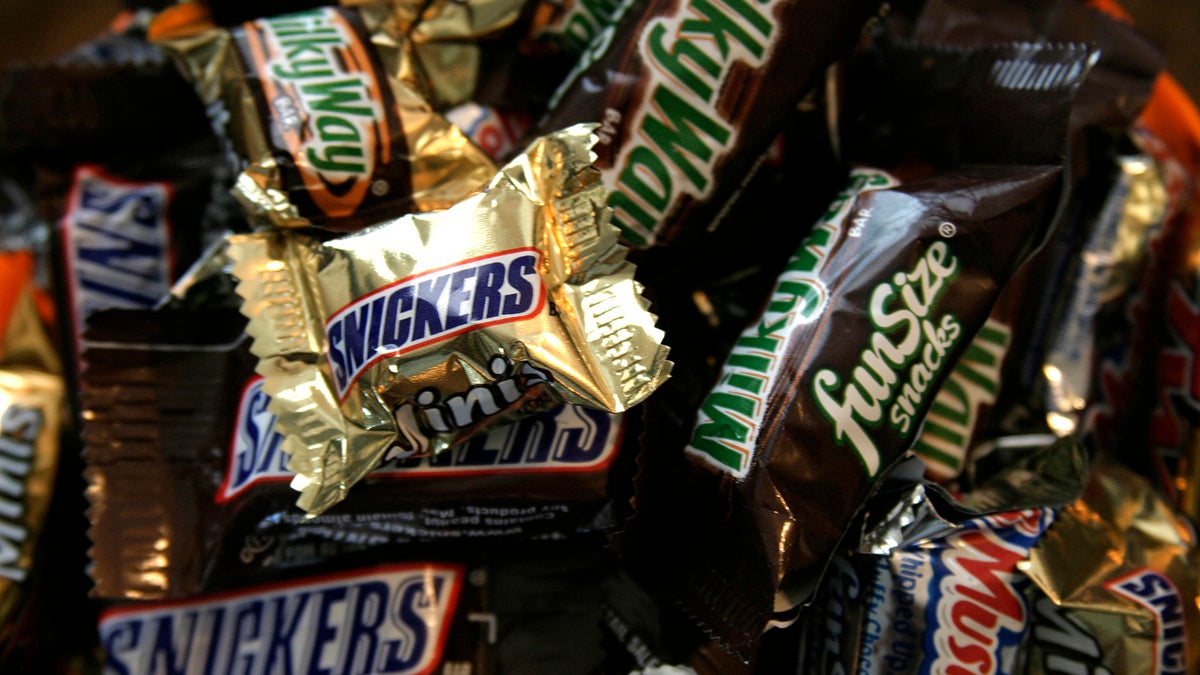Why is halloween candy (and all other candy) so bad for us?
Listen
(AP Photo/Dan Goodman
Trick or treat! Candy is everywhere this week, but why should we all try our best to resist it?
Trick or treat! It’s candy time and children everywhere will be hauling home bags and bags, and then office tables everywhere will carry the leftovers. And we’ll all try to do our very best to resist.
But why? We know that sugar is bad for you, but what exactly does it do to you that’s so bad?
Visit the candy aisle at your local drug store and it’s obviously Halloween. Kids are excited to get big collections of candy, but many parents may choose to ration out the goodies. It’s common knowledge that kids and adults alike should try to avoid sugar, and we wanted to know why.
Dr. Daniel Monti, head of the Myrna Brind Center of Integrative Medicine described the process of breaking down sugar.
“When anybody takes in a load of sugar, from candy, or a sugar-sweetened beverage. That substance will go to the gut, get absorbed into the bloodstream, and that will cause a rise, temporarily, in blood sugar levels,”
Monti stressed that too much sugar is particularly damaging over time.
“As we have an excess amount of sugar that we’re eating on a regular basis, that sugar coats the protein in our red blood cells. And causes them to be stiff. Or some people would refer to them as sticky, and that affects circulation”
Those sticky red blood cells can damage blood vessels, he says, and pave the way for plaque formation. He adds that particularly for people who are overweight or obese, eating too much sugar can lead to diabetes, and fatty liver disease.
Dr. Mark Schutta, medical director of the Rodebaugh Diabetes Center at Penn hospital, asserts that moderate amounts of sugar can be metabolized effectively in thin people who live healthy lifestyles.
“Your sugar will get absorbed fairly rapidly through your gastrointestinal tract. And, your insulin that’s secreted from your pancreas will spike in order to take care of the glucose, and get into the cells where it needs to go. And if you’re a thin person, that process works incredibly efficiently.”
If you are overweight, he says, your brain may not be getting the right signals about your sugar intake.
“So when people are overweight or obese, they tend to have higher insulin levels. And the problem with that is they don’t get the correct signal that they’re supposed to go ahead and exercise and burn off the sugar, and the other thing is, they don’t get a signal that says I’ve had enough, I don’t need anymore. So someone who’s overweight or obese, may get a message that says, I want to eat more of this, and I don’t want to move at all. I just want to sit around. And that’s a problem.”
But whatever your weight, Dr. Schutta stressed that the most important thing to remember about candy, is moderation. For kids, Schutta says that’s about one “fun size” piece of candy per day.
WHYY is your source for fact-based, in-depth journalism and information. As a nonprofit organization, we rely on financial support from readers like you. Please give today.



